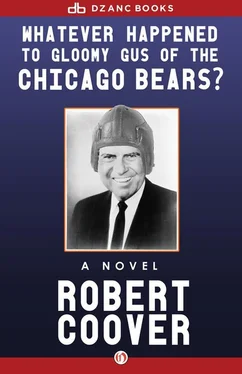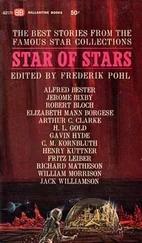Robert Coover - Whatever Happened to Gloomy Gus of the Chicago Bears?
Здесь есть возможность читать онлайн «Robert Coover - Whatever Happened to Gloomy Gus of the Chicago Bears?» весь текст электронной книги совершенно бесплатно (целиком полную версию без сокращений). В некоторых случаях можно слушать аудио, скачать через торрент в формате fb2 и присутствует краткое содержание. Год выпуска: 2014, Издательство: Dzanc Books, Жанр: Современная проза, на английском языке. Описание произведения, (предисловие) а так же отзывы посетителей доступны на портале библиотеки ЛибКат.
- Название:Whatever Happened to Gloomy Gus of the Chicago Bears?
- Автор:
- Издательство:Dzanc Books
- Жанр:
- Год:2014
- ISBN:нет данных
- Рейтинг книги:4 / 5. Голосов: 1
-
Избранное:Добавить в избранное
- Отзывы:
-
Ваша оценка:
- 80
- 1
- 2
- 3
- 4
- 5
Whatever Happened to Gloomy Gus of the Chicago Bears?: краткое содержание, описание и аннотация
Предлагаем к чтению аннотацию, описание, краткое содержание или предисловие (зависит от того, что написал сам автор книги «Whatever Happened to Gloomy Gus of the Chicago Bears?»). Если вы не нашли необходимую информацию о книге — напишите в комментариях, мы постараемся отыскать её.
Whatever Happened to Gloomy Gus of the Chicago Bears? — читать онлайн бесплатно полную книгу (весь текст) целиком
Ниже представлен текст книги, разбитый по страницам. Система сохранения места последней прочитанной страницы, позволяет с удобством читать онлайн бесплатно книгу «Whatever Happened to Gloomy Gus of the Chicago Bears?», без необходимости каждый раз заново искать на чём Вы остановились. Поставьте закладку, и сможете в любой момент перейти на страницу, на которой закончили чтение.
Интервал:
Закладка:
So what drew him to football in the first place? I’m not sure. When his brother came through looking for him a couple of weeks after Maxie’s party, I asked him how it had started, and what he said was: “I think it was because of the challenge. It was the thing he was worst at. That and getting on with girls. He used to be good at lots of things. Like mashing potatoes, for example. Or debate. Studies. We all thought he was going to be a teacher or a lawyer. Dick was always reserved. He was the studious one of the bunch, always doing more reading while the rest of us were out having fun. But what he did well, he took no pleasure in, while what he did badly made him very upset.”
“Did he talk about these things?”
“No, he just got tics.”
Most of what I’ve come to know about Gloomy Gus, I learned from his brother on that surprise weekend visit and from the Hearst reporter doing the whatever-happened-to wrap-up. Neither man was very intelligent and I had to piece a lot of it together myself, but I was helped by the sportswriter’s notes and a scrapbook of Gus’s football career that his brother brought along with him, together with some testimonials from girls he’d had. This brother is a grocer and souvenir seller with his father back in Gus’s hometown, and I gathered they’d been cleaning up by playing on Gus’s national fame — he showed me a picture of the store and it was full of Chicago Bears programs, pennants, publicity shots, and the like, as well as footballs, jerseys, autographed photos of famous ladies, and other mementos of the Bears’ All-Pro halfback. He expressed a great deal of concern for his brother, but it was obvious that underneath he was angry and embarrassed by the way Gus had let him down. “So this is where he’s ended up,” he said, gazing around my studio. “I never realized Dick had fallen so far…”
Apparently, the critical turning point in Gloomy Gus’s life came during his freshman year at Whittier College out in southern California. At that moment, he did what sooner or later we all do: he began to simplify himself. I can understand this: my sculpting is not something that was added to an expanding life, but that which remains after all the other things have been peeled away, things that, who knows, I might have been better at. We all have too few lives to live. Later, in an unpublished interview, Gus was to say that all he ever wanted to do was play football and screw girls, but up till that autumn in 1930 he had been trying to score everywhere at once: as a scholar, a politician, an organist, pianist, and violinist, a carny barker, gas station attendant, Quaker Sunday School teacher, debater and actor, entrepreneur, journalist, songwriter and playwright. A familiar pattern: he seemed destined to become president of the local Chamber of Commerce, or maybe a judge. He’d won scholarships, elections, awards, leading roles, oratorical contests, and public praise. But he still hadn’t been able to make the football team or coax a girl’s underpants down.
Which was more important to him is not clear. In later years, Gus himself spoke mostly about football, but the Hearst guy insists that under the uniform he was “ninety-nine and forty-four one-hundredths percent pure hard-on.” Gus’s brother had no opinion, though when I asked he winked broadly. This wink was a peculiarity of Gus’s brother, however, and could have signified anything. Girls admired Gus apparently, but they didn’t have much fun with him. He developed a kind of paranoia, stimulated by some advertisement maybe, about having bad breath — each morning before leaving the house, he used to brush his teeth, gargle with special mouthwashes, and make his mother smell his breath — but at least part of the problem was that on dates he talked to the girls about such things as what might have happened to the world if Persia had conquered the Greeks, and then with no transition tried to wrestle them to the floor. This never worked. Likewise with the football: it was all verbal. Maybe his early successes with debates and elections had twisted him a bit. One teammate who knew him that freshman year summed up his talents very simply: “Dick had two left feet. He couldn’t coordinate.” Then why was he allowed to go on working out with the team? “He was always talking it up. That’s why the Chief let him hang around. He was one of the inspirational guys.” Of course, even the talking had required practice and so, like his acting, was cued and predictable, though maybe people failed to notice this at the time. A kind of religious recitation. We tried him out on winter nights around my stove. If you said, “Keep it rolling,” he’d say, “Fuckin’ good game!” If you said, “That’s showing them,” he’d say, “Make ’em eat shit!” Et cet.
The Chief was not an ungenerous man; he might have let Gus play from time to time just to be fair about it. Shut him up maybe. Besides, the Whittier Poets were terrible teams, freshmen and varsity both, they were sure to lose, no matter who played. But Gus suffered from something worse than just the two left feet: uncontrollable overeagerness. Every time he went into the game, he immediately went offside. As he bounded forward, his team marched backward, five penalty yards per play. Even if he was centering the ball himself (the Chief was resourceful, he tried that one too). He just couldn’t hold himself back. Girls, too, who might have surrendered to him in a moment of whimsical magnanimity, were put off by the way he lurched out of control before the foreplay had even begun.
There seemed to be no motive behind this over-eagerness. It was just a part of him, like the two left feet — it was difficult, in fact, for him to recognize that the fault might be his: he thought the rest of the world had two right feet and tended to collapse into slow-motion sequences. This characteristic, which was less than zeal but more than a conditioned reflex, may have got a certain amount of encouragement in his early life, since in other activities less formal than football and courtship it had served him well — he was like a jack-in-the-box in classrooms and student assemblies, debates, and fraternity meetings, and he won everything simply by astonishing everybody else into silence — but it was not basically something learned. I don’t know much about his birth (except that the sportswriters always liked to claim there was an eclipse of the sun that day), but I wouldn’t be surprised to learn that he came tearing out of his mother’s womb well before she was ready. He had what I can only describe as a short-circuited stimulus — response system in which everything operated on the knee-jerk principle. He spent most of the last six or seven years of his life struggling against this flaw, but as with any fundamental characteristic, the more he fought it, the more it dominated his life. With me it’s passivity, the open door; with Gloomy Gus, it was the plunge offside.
What had always worked best for him in his other activities was his discipline (also innate maybe, a kind of corollary of the overeagerness, but probably not; maybe his mother stuffed it into him with her Bible readings) — his careful preparations, self-control, dogged practice — so that’s what he turned to now in the fall of 1930 in his effort to overcome his failure on the football field and in the back seats of cars. I say “turned to,” “effort to overcome,” but I don’t mean to suggest there was anything overtly conscious about it. I’ve tried to imagine what bent him that fall and started him down the path to the Memorial Day massacre at the Republic Steel plant. He seemed uninterested in rewards, popularity, even love or happiness, and he was impervious to ridicule or criticism. Yet, at the same time, he lived in almost freakish immediacy to the world around him, a helpless puppet on a string, elbows akimbo and left feet twitching at every social whim. I don’t think he even “wanted” to play football or have sex — it was the world that told him he wanted these things, just as it might have told him instead to work for the New Deal, market frozen orange juice, get rich in Cuba, or run for Congress. He was nothing but Self, yet so invaded, more selfless than any of us in a way; without the sense of Audience, he would have been a lifeless pile of sticks and rags. Such a system may be reinforced by rewards and applause, but by small increments only. Only one thing will turn it around: violent disapproval. Fury. Rage. A beating, even. Who tore into him finally? Was it the coach? His heavy-handed father? His girlfriend?
Читать дальшеИнтервал:
Закладка:
Похожие книги на «Whatever Happened to Gloomy Gus of the Chicago Bears?»
Представляем Вашему вниманию похожие книги на «Whatever Happened to Gloomy Gus of the Chicago Bears?» списком для выбора. Мы отобрали схожую по названию и смыслу литературу в надежде предоставить читателям больше вариантов отыскать новые, интересные, ещё непрочитанные произведения.
Обсуждение, отзывы о книге «Whatever Happened to Gloomy Gus of the Chicago Bears?» и просто собственные мнения читателей. Оставьте ваши комментарии, напишите, что Вы думаете о произведении, его смысле или главных героях. Укажите что конкретно понравилось, а что нет, и почему Вы так считаете.












